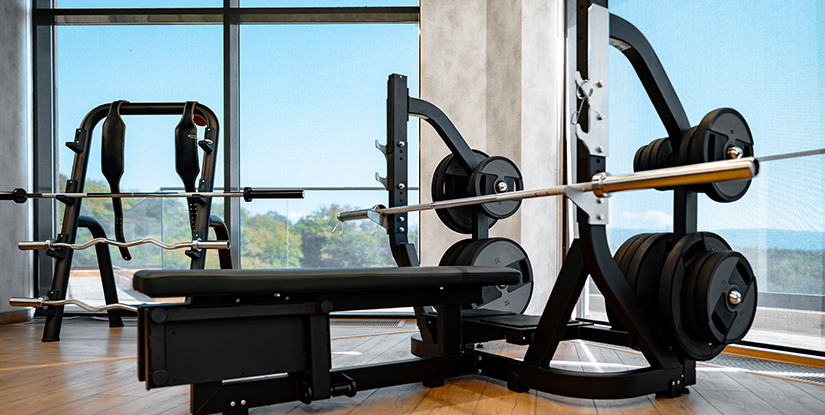The bench press is one of the most fundamental strength exercises, focusing primarily on the chest, shoulders, and triceps. It is a staple in most weight training programs and a key measure of upper body strength. For beginners, setting realistic strength goals is crucial to avoid injury and build a solid foundation. The 100 lb bench press is often considered a common benchmark for novice lifters, representing a milestone for those starting out. Reaching this goal helps establish confidence and provides a clear target to progress further. In this article, we will explore how beginners can approach their bench press training effectively and gradually increase their strength with proper techniques.
Is a 100 lb Bench Press Good for a Novice?
The 100 lb bench press is often considered a significant milestone for novice lifters. For beginners, being able to press 100 lbs represents a level of foundational strength and is frequently seen as a good starting point for those new to resistance training. It signifies that the individual has developed the necessary muscle coordination and form to perform the exercise effectively. For many, the bench press 100 lbs becomes a motivating goal that signals progress toward improving overall upper body strength.
Is 100 lbs a Good Starting Point for Most Individuals?
For most novice lifters, especially those who are relatively new to strength training, pressing 100 lbs may be a reasonable and achievable starting point. However, it’s important to understand that there is no one-size-fits-all answer. The 100 lb bench press could be a good goal for some beginners, but others might start lower based on their physical condition. Novices should avoid pushing themselves too quickly and focus on gradually building strength with proper form and technique.
Factors to Consider
Individual Body Weight and Composition
A person’s body weight and muscle mass play a critical role in how much they can lift. Heavier individuals with more muscle mass may find the 100 lb bench press more achievable, while lighter individuals might start with lower weights.
Experience Level
For true beginners, a 100 lb bench press might be a long-term goal, while someone with some prior experience in weight training might achieve it sooner. It’s essential to recognize that individual progress varies, and lifting 100 lbs could take time for those just starting out.
Gender Differences and Average Strength Standards
Men, on average, tend to have greater upper body strength than women, meaning a bench press 100 lbs might be an easier target for male beginners than female ones. That said, women can certainly progress toward this goal with consistent training. Gender differences in strength should be acknowledged, but they shouldn’t deter individuals from setting personal benchmarks and working toward them.
The 100 lb bench press is a great milestone for novice lifters to aim for, but it’s essential to consider individual factors when determining personal goals. With proper training, technique, and patience, reaching and surpassing this benchmark is entirely achievable for most beginners.
Is a 100 lb Bench Press Good for a 13-Year-Old or 14-Year-Old?
Age and Strength Development:
When it comes to strength training for adolescents, such as those who are 13 or 14 years old, it’s important to understand that strength development varies greatly depending on several factors, including puberty, gender, and individual fitness levels. During these early teenage years, the body is still growing, and muscles and bones are more vulnerable to injury if not properly cared for. As a result, a 100 lb bench press can be considered quite an advanced feat for most 13- and 14-year-olds, especially for beginners.
For adolescents at this age, average strength benchmarks typically fall below this number, with many young lifters only bench pressing between 40 and 70 lbs when they first begin training. 100 lb bench press is more commonly seen in 14-year-olds who have been training consistently or those with a naturally higher strength potential, but even for them, this is an impressive mark. It’s important to remember that strength levels at this age are influenced by factors such as training experience, muscle development, and how far along the adolescent is in their growth stage.
Safety Tips for Youth
For young lifters, proper form and safety should always be the primary concerns. Lifting heavy weights like the 100 lb bench press without the proper technique can put immense stress on growing muscles, joints, and bones, increasing the risk of injury. Therefore, it’s essential for adolescents to undergo supervised training with a certified coach or trainer, especially when attempting lifts that are at or above their current strength level.
One key safety consideration is to ensure the proper use of equipment, including using a spotter when bench pressing. Even if the weight seems manageable, the risks associated with the barbell dropping or losing control of the lift are significant without a spotter or adequate safety precautions in place. Additionally, youth lifters should focus on gradually building strength through incremental weight increases, starting with lighter weights and perfecting their form before moving on to heavier lifts.
While the 100 lb bench press can be a great milestone for a 13- or 14-year-old who has been training consistently, it’s essential that strength training is approached thoughtfully, with a focus on safety, form, and gradual progression.
Strength Standards: Where You Might Stand (kg)
For Men:
| Strength Level | Weight(kg) | Weight(lb) | Bodyweight Ratio |
|---|---|---|---|
| Beginner | 17 kg | 85 lb | 0.20x |
| Novice | 30 kg | 127 lb | 0.40x |
| Intermediate | 47 kg | 180 lb | 0.60x |
| Advanced | 68 kg | 243 lb | 0.85x |
| Elite | 91 kg | 312 lb | 1.15x |
For Women:
| Strength Level | Weight(kg) | Weight(lb) | Bodyweight Ratio |
|---|---|---|---|
| Beginner | 6 kg | 43 lb | 0.10x |
| Novice | 14 kg | 68 lb | 0.20x |
| Intermediate | 25 kg | 101 lb | 0.40x |
| Advanced | 39 kg | 140 lb | 0.60x |
| Elite | 55 kg | 184 lb | 0.85x |
100 lb Bench Press Progression
How to Improve from 100 lbs
Achieving a 100 lb bench press is a fantastic milestone for novice lifters, but the real challenge lies in progressing beyond this weight. To continue improving, it’s essential to implement progressive overload—a principle that involves gradually increasing the weight, number of reps, or both to consistently challenge the muscles and promote growth. For example, once you can bench press 100 lbs for a set of 10 reps, you can begin by adding small increments, such as 5-10 lbs, to the barbell and attempt to complete 6-8 reps with the heavier weight. This method allows you to steadily increase your strength without overloading your body too quickly.
In addition to adding weight, tracking your progress effectively is key. Keep a training log that records the weights you use, the number of sets and reps, and how you feel during each session. This not only helps you stay motivated but also gives you a clear picture of your progression. Setting new goals as you advance is another crucial step. After reaching 100 lbs, aim for a new target like 115 lbs or 125 lbs. This gives you a specific goal to work towards, and breaking it down into smaller, achievable steps will keep you on track.
Bench Press Workouts for Novices:
If you’ve just hit the 100 lb bench press and are looking to build upon that achievement, creating a solid workout plan is essential. For novice lifters, focusing on form and consistency is crucial, as it sets the foundation for future progress. A well-rounded bench press workout should include variations of the bench press and accessory exercises to target the supporting muscles, such as the triceps, shoulders, and upper back.
Flat Bench Press
Stick with your main lift, aiming for 3-4 sets of 6-8 reps. After hitting 100 lbs, add small increments (5-10 lbs) once you can consistently complete 8 reps with the current weight.
Incline Bench Press
This targets your upper chest and shoulders more, and performing 3 sets of 8-10 reps can help develop overall bench press strength.
Triceps Dips or Push-Ups
As your triceps play a significant role in the bench press, strengthening them through dips or push-ups is beneficial. Aim for 3 sets of 10-12 reps.
Dumbbell Bench Press
Incorporating dumbbells will improve your stability and work the chest muscles more deeply. Perform 3 sets of 8-10 reps with moderate weight.
Accessory Shoulder and Back Exercises
Lateral raises, face pulls, and rows will strengthen the muscles that assist in bench pressing, making you more stable and effective when lifting heavier weights.
Consistency is the key here, and while adding weight is important, it’s equally vital to ensure you’re performing each rep with proper form to avoid injury. Over time, as you increase the weight, you should also continue working on endurance by pushing yourself to complete more reps at lower weights. This balanced approach will help you move past the 100 lb bench press and work toward your next strength goals.
FAQ about 100 lb Bench Press
It depends on your size, age, and training experience. For beginners or smaller individuals, benching 100 lbs is a solid start and shows you’re building basic strength. However, for larger or more experienced lifters, it’s more of a warm-up weight. As you train consistently and improve form, you’ll likely see your numbers climb quickly. So yes—100 lbs can be a good benchmark depending on your personal starting point.
Most lifters consider bench pressing your body weight a solid strength milestone. It shows you’ve built a balanced level of upper-body power and control. For recreational lifters, that’s a respectable achievement. Lifters aiming to push further often train to bench 1.25 to 1.5 times their body weight—especially in gym or athletic settings. But reaching 100% body weight is definitely a goal worth celebrating!
Yes, most healthy adults can lift 100 pounds with proper form and training. It might not happen right away, especially for untrained individuals, but with consistent strength work, it’s an achievable target. Whether it’s lifting a barbell, a sandbag, or even everyday objects, 100 pounds is a manageable weight for most people once they build up strength and confidence.
The heaviest official bench press ever recorded is 1,102 lbs (500 kg) by Jimmy Kolb in 2023—done in a bench shirt under equipped powerlifting rules. For raw (no shirt) lifting, Julius Maddox holds the record at 782 lbs (355 kg). These are elite numbers that take years of focused training, diet, and technique. While most lifters won’t reach those levels, they show what’s possible at the top end of human strength.

Hi, I’m the editor here at Leadman Fitness. We’re a manufacturer focused on producing top-quality barbells, plates, kettlebells, dumbbells, and strength training gear. I’ve been into sports and fitness for years, and I know my way around all kinds of gym equipment—both from using it and helping create it.
I spend a lot of time understanding the real problems people run into in the gym—whether it’s beginners trying to pick the right gear or experienced lifters looking for something more durable. I stay in close touch with our production team and talk directly with other equipment makers, so we’re always improving based on what real lifters and coaches are looking for.
What I share comes from hands-on experience—stuff that actually helps people train better, not just in theory, but in real gyms.
